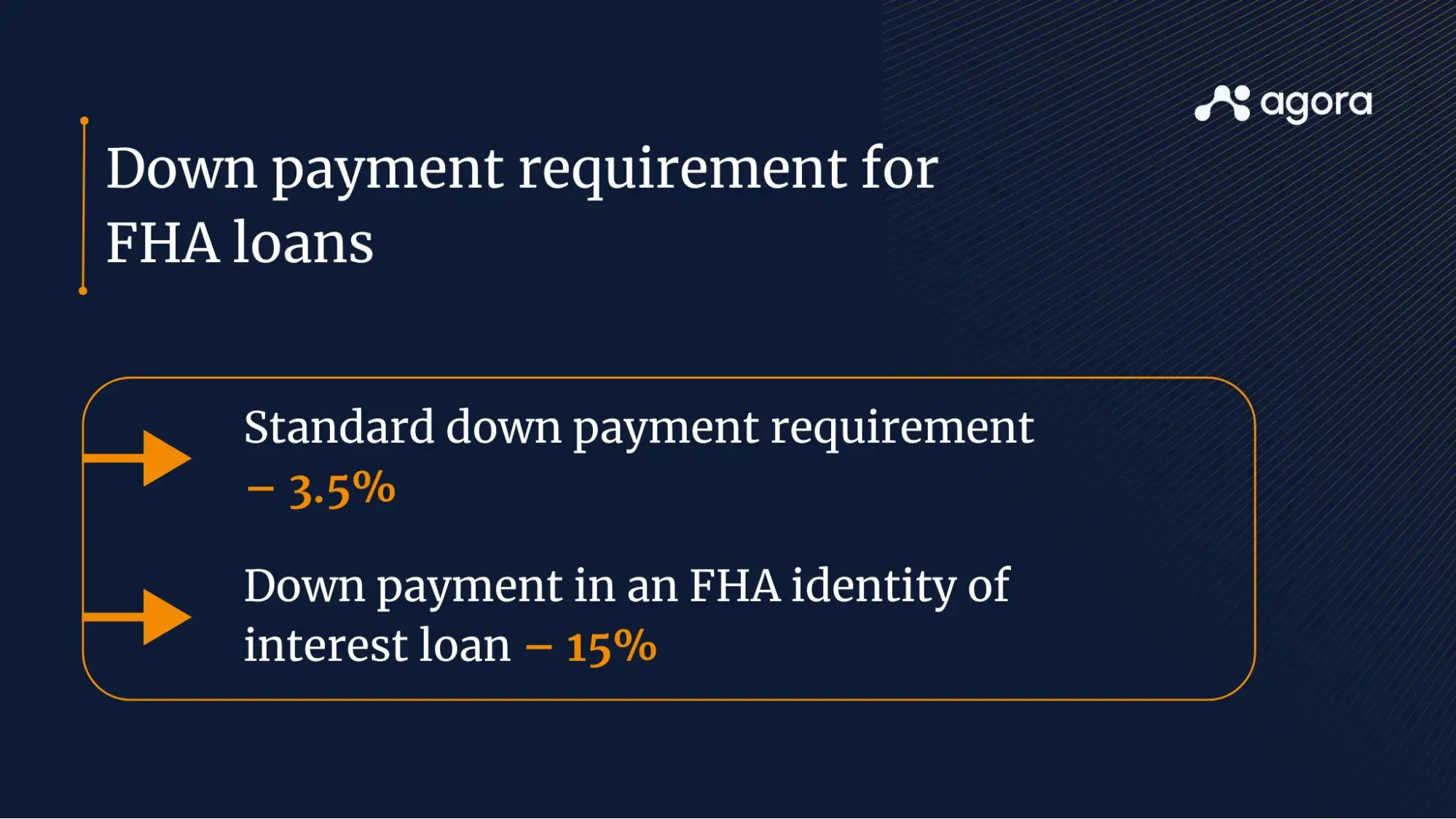Key takeaways
- Triggered identity of interest raises the FHA loan down payment requirement from 3.5% to 15% when the buyer and seller have a pre-existing personal or business relationship.
- Non-arm’s length scrutiny adds complexity, requiring borrowers to submit more documentation and face slower approval due to perceived risks in the transaction’s market fairness.
- Defined exceptions apply that can restore the 3.5% down payment, including purchases involving job relocations, primary residences of close family members, or long-term tenant-landlord relationships.
- Operational challenges include borrower unawareness of the rule, difficulty securing the higher down payment, and increased documentation demands during underwriting.
- Best practices involve early disclosure to lenders, gathering required relationship and residency proof, preparing financially, and potentially working with a mortgage broker to streamline the process.
What is identity of interest in terms of an FHA loan?
A person planning to apply for a Federal Housing Administration (FHA) loan could have to deal with certain restrictions if the transaction attracts the FHA identity of interest rules. According to these rules, FHA identity of interest is applicable when the buyer and seller of the home being financed are related in some manner. For example, a son could buy property from his father, or an employer could sell a condo to an employee. In these scenarios, the identity of interest would apply.
The FHA views a pre-existing relationship between the buyer and the property seller as a negative signal or an alarm for a simple reason. They think that the sale may not be an arm’s length transaction. In other words, the buyer and the seller may have a common financial interest, and the property’s purchase price may differ from its fair market value.
Consider a situation where the buyer and seller have an existing business relationship or a personal relationship. In these circumstances, the FHA identity of interest would apply, as the Federal Housing Administration loan office would assume that the property in question would not be put up for sale in the open market. The FHA would classify the arrangement between the buyer and the seller as a non-arm’s length transaction.
An identity of interest can have adverse effects on the borrower. It can make getting the mortgage approval more difficult. Additionally, borrowers may find that the low down payment requirements, one of the biggest attractions of FHA loans, are no longer available to them.
How FHA identity of interest can affect your down payment
The primary impact of the FHA identity of interest on borrowers taking FHA loans is a higher down payment requirement. The norm for these loans is a minimum down payment of 3.5%. However, if the identity of interest is triggered, this can shoot up to 15%.

How does FHA identity of interest impact borrowers?
A higher minimum down payment is one of many drawbacks that an identity of interest has for FHA loan applicants. There are several other disadvantages:
The downsides of purchasing property from a relative or business associate
While buying property from a relative has benefits, there are disadvantages, too. For example, you may end up paying a higher than market rate. Bear in mind that it can be difficult to haggle on the purchase price with an employer or a relative.
Raising extra cash for the down payment
Borrowers must arrange the money to pay the increased down payment. Ironically, one of the principal reasons that borrowers apply for FHA loans is because they have low down payment requirements. However, if an FHA identity of interest applies to the borrower, the down payment requirement increases several times from 3.5% to 15%.
Getting approval from the FHA loan office
The FHA loan office will likely scrutinize an identity of interest transaction more closely. Consequently, borrowers should be prepared to meet additional document requirements and wait longer for approval.
FHA identity of interest exceptions
The good news is that there are several FHA identity of interest exceptions that can help borrowers maintain the down payment at a reasonable level of 3.5% instead of the far more stringent 15%. The exceptions are:
- Employee purchase: An employee purchasing a home from an employer when the employee’s job is relocated can be exempt from the higher down payment requirement.
- Family member purchase: The exemption can apply if the property being purchased is the primary residence of a spouse, fiance, or family member. However, the condition here is that you must have lived in the house for at least six months.
- Tenants purchasing from landlords: A home purchased from your landlord can be exempt. This relief can be available if you have lived in the house for at least six months.
FHA identity of interest exceptions
| Nature of exception | Main condition to be met |
| Employee purchase | The purchase must be in connection with a job relocation agreement. |
| Family member purchase | You must buy the primary residence of a close family member and you must have lived in the house for at least six months. |
| Purchase from your landlord | You must have lived in the house for at least six months. |
Challenges of FHA identity of interest transactions
In which way does the FHA identity of interest affect borrowers? The challenges fall into three broad categories. First, an FHA loan applicant may not be aware that such a rule exists and that it comes with a significant financial impact in the form of a higher down payment.
Secondly, you can expect the approval process to slow down. The FHA loan office will likely examine the application more closely if there is a financial interest between the buyer and seller. Finally, in FHA identity of interest transactions, you could be expected to provide additional documentation to support your loan application.
Tips for navigating the loan approval process with identity of interest
Here are some steps to overcome the issues arising from your loan application being viewed as an FHA identity of interest transaction.
- Step 1: Inform the FHA loan office about the identity of interest as soon as possible: It is a good idea to tell the lender that the identity of interest may apply to your loan application.
- Step 2: Keep the relevant details and records ready: You can be asked to provide additional documentation and financial records. It is best to be prepared.
- Step 3: Be ready to pay the higher down payment: Despite your efforts, you may be required to pay a 15% down payment. Think about how you will arrange the extra cash.
- Step 4: Consider consulting a mortgage broker: The appropriate professional advice can be a game changer. A good mortgage broker can tell you how to speed up your approval or help in other ways.
Required documentation for an identity of interest in an FHA loan
Collect the following documents and keep them handy. You may need them when your loan application is being processed:
- Evidence of the connection between the buyer and seller: Written evidence confirming the relationship is necessary.
- Proof that the property has been rented for the last six months: Keep the lease agreement between the landlord and the renter handy. The lease should be for a minimum of six months immediately preceding the sale of the property.
- Paperwork evidencing the sale by the employer to the employee: You need to provide documents that prove your employer has relocated you to the place where the property is situated in addition to property sale documents.
- Complete details of the property being sold: You must provide property documents as well as full particulars about the sale transaction.
It is also crucial to keep in mind that the lender* may have additional documentation requirements.
*The Federal Housing Administration does not provide loans. Banks and other financial institutions approved by the FHA advance funds to the borrower. The FHA’s role is to guarantee the loan.
The bottom line
An FHA loan can be an excellent option for home buyers. However, if the borrower has a preexisting relationship with the property’s seller, the FHA can view this negatively and raise the down payment requirement from 3.5% to 15%. Fortunately, specific exceptions to this rule allow the down payment to be maintained at 3.5%.










